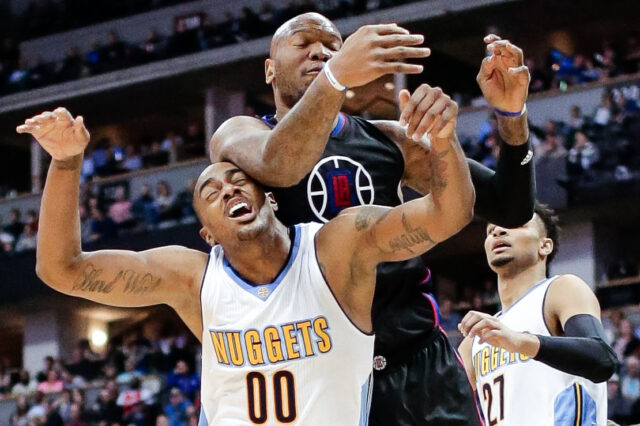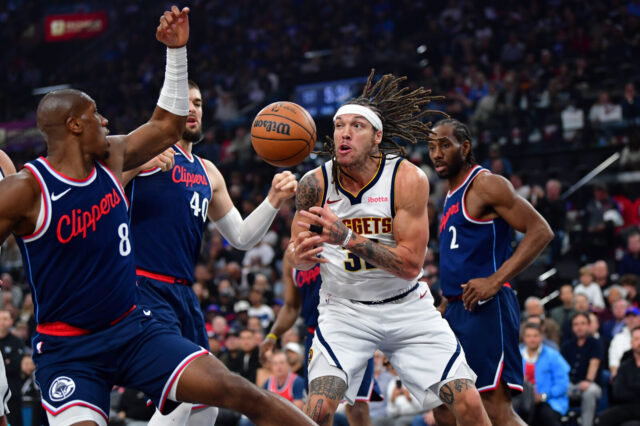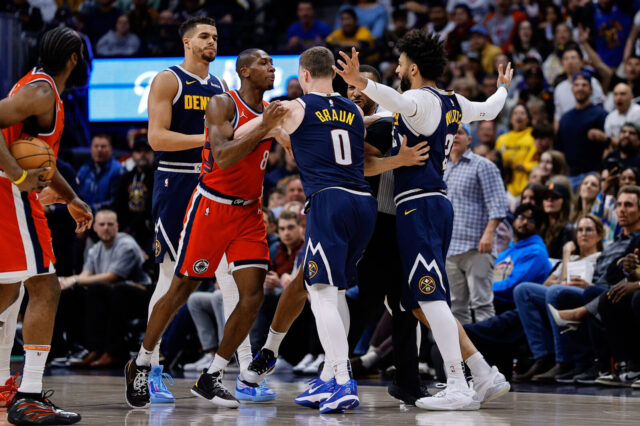Today’s date is Monday, March 16th, 2020. During the normal NBA calendar, the Denver Nuggets would have 15 games left in the regular season. Expectations would be firmly set based on the standings in the Western Conference and NBA at large. The last 15 games would be used to finalize seeding and prepare the entire organization for a potential playoff run.
But the COVID-19 shutdown happened last Wednesday, and everything changed.
Coronavirus has altered our perceptions on the NBA season, causing some abrupt halt to perspectives that were still in development. The teams with the highest aspirations — Los Angeles Lakers, Los Angeles Clippers, and Milwaukee Bucks — have been left wondering whether they would complete their journey through the playoffs. Teams with young superstars like the New Orleans Pelicans and Dallas Mavericks were left dreaming of just how high the ceiling could go.
The Denver Nuggets were in their own group: teams chasing the title contenders. At any point, the Nuggets, Philadelphia 76ers, Houston Rockets, Toronto Raptors, Utah Jazz, Boston Celtics, and Miami Heat have been considered the strongest challengers in this group. The truth of the matter is different: all of the teams listed are chasing the two Los Angeles teams and Milwaukee, and none of the challengers would be favored in a playoff series against those three squads.
Denver’s expectations at the beginning of the season more or less mirrored what actually happened. At this current moment, they are the 3rd seed in the Western Conference and likely would have finished that way. The major discrepancy comes in the form of playoffs. Nobody questioned whether the Nuggets could put up regular season wins, but rather whether their style could translate to a deep playoff run, if they had enough talent to match up with the best teams, and if their weaknesses would be debilitating.
So, would the Nuggets have answered those questions? Would Nikola Jokic and Jamal Murray be enough to make a title run? Was Denver lacking wing stoppers going to be their ultimate downfall? Where would Michael Porter Jr. have fit into the playoff equation?
This content is no longer available.
Win profile during the last two seasons
(League wide ranks for each metric in brackets)
Win-Loss %: 66.1% in 2019-20 (6th) | 65.9% in 2018-19 (4th)
Simple Rating System: +3.02 in 2019-20 (9th) | +4.19 in 2018-19 (7th)
Net Rating: +3.1 in 2019-20 (9th) | +4.0 in 2018-19 (8th)
VS +.500 teams: 15-11 in 2019-20 (4th) | 24-20 in 2018-19 (6th)
If one were to evaluate Denver’s regular season from afar, the numbers would point to the Nuggets being a worse team in 2019-20 than they were in the previous season. A lower win percentage rank, Simple Rating System (SRS: a metric on Basketball Reference that accounts for strength of schedule and margin of victory), and Net Rating all point to the Nuggets being less effective this season. To some degree, this is true. They have a slightly higher win percentage this year, but the rest of the NBA got better around them, and it’s clear that the Nuggets didn’t become tangibly better.
However, the key to this season was Denver winning a higher percentage of games against good teams. Their win percentage against +.500 teams this year ranks fourth behind only the three leading contenders this year, a good sign that Denver’s ceiling was more lofty. Great teams find a way to win against other great teams. The highest seeded teams find a way to win against the bad teams. There’s a distinct difference there.
It’s clear though that the devil was in the details for the Nuggets this year. During his introductory press conference this year, head coach Michael Malone said he would be preparing his team for a 110-game season as opposed to the standard 82-game regular season. This was to account for a long term view and thinking about how best to prepare physically, mentally, and schematically for a deep playoff run. What was forgotten was the regular season, particularly against bad teams. Nuggets fans can point to several losses against inferior opponents to see that this was a problem, but it’s deeper than that. Details involve closing out fourth quarters and generating blowout wins, not letting opponents back into a game, and putting away a bad team so they don’t have any reason to fight.
Take 10+ point wins this year. The Nuggets won 16 games by 10 or more points this year. That ranks tied for 12th with four other teams, meaning one less win and Denver could have dropped to 16th. That is absurdly low. The year before, the Nuggets had 23 in total, tied for ninth among all teams and showcasing exactly why Michael Malone had several gripes this year. The Nuggets, rightly or wrongly, didn’t take the regular season as seriously this year.
This team had more talent this season. They added Jerami Grant to replace Trey Lyles, added Michael Porter Jr. to the fringe of the rotation, and were relatively healthier than the year prior. There’s no reason the team should have had a worse regular season win profile than the year before when they are a better quality team. And yet, those bad losses just kept piling up.
This content is no longer available.
It’s unclear whether the Nuggets had an additional gear in the playoffs or not. In my opinion, they were the fourth best team in the West last year behind the Golden State Warriors, Houston Rockets, and Utah Jazz that underachieved against an older Portland Trail Blazers squad.This year, the talent gap was unclear, but it sure seemed like the two teams higher than Denver in the standings (Lakers and Clippers) were definitively better. If the Nuggets had lost to either of those two teams in a competitive playoff series, nobody would have batted an eye.
However, had the Nuggets lost to any other team in a playoff series this year, things would be a lot more complex. Houston made a trade to go all-in on small ball, but the Nuggets had a couple counters that should have elevated them in a playoff series. Utah was falling apart even before Rudy Gobert developed a rift with Donovan Mitchell and the rest of the rotation. The Dallas Mavericks were very similar to the Nuggets of 2018-19: a young, talented roster that needs playoff experience. The Oklahoma City Thunder, though very competent, don’t have a high playoff ceiling.
So much of Denver’s season expectations relied on these playoff tests. Nearly every time the Nuggets lost to a bad team, the justification centered around the team having a larger goal and just overlooking the inferior opponent. That’s perfectly reasonable…if the team performs well in a playoff series. Right now, that seems to be put on hold.
So, were the Nuggets better this season that last season? Regular season stats say no. The playoffs may formed a different story, but we may never know for sure.


